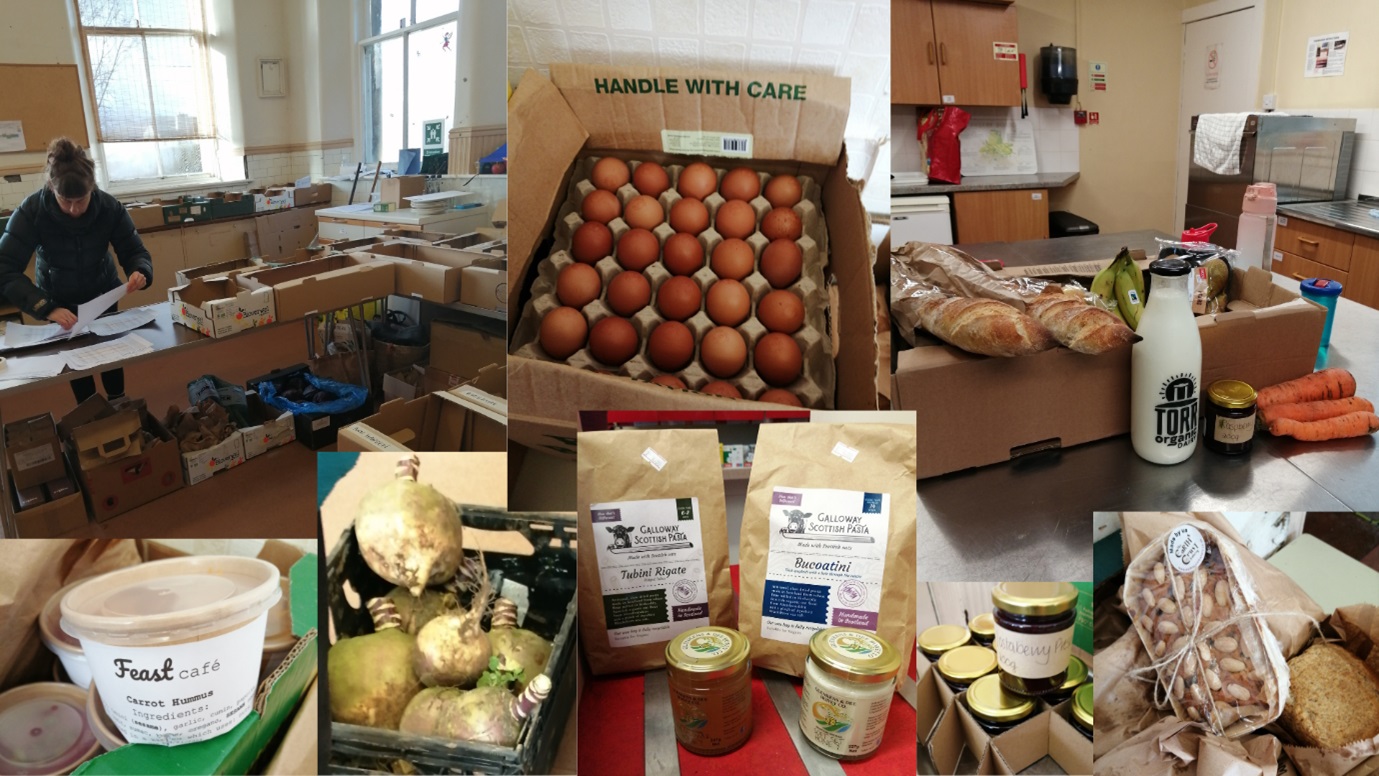From local food in Glenkens and Uist to global markets

SRN have been working in partnership with CoDeL to identify community practices and learning opportunities that could help to inform policy development to address priority actions. These include measures to tackle poverty within rural and island communities. In this blog article, Thomas Fisher (Director of CoDeL) reflects on a knowledge exchange visit between Glenkens and Uist.
It is local organisations that are driving the local food agenda in both Glenkens and Uist. While we await the local food plans that every council is mandated to create under the Good Food Nation Act, community organisations are moving ahead swiftly, delivering the innovation and practice needed to ensure that the local food agenda can work in their own specific context.
We visited the Galloway Food Hub in Dalry on a Friday morning, when 2 staff and 8 volunteers were packing all the produce. Boxes covering different tables for different delivery runs, ... local producers dropping in throughout the morning to deliver their diverse produce, fruit, vegetables, eggs as well as bread, jams, honey and even pasta, that would be delivered that afternoon,... the small packing room, in an old school, was bustling with energy.

The Galloway Food Hub is creating a thriving, producer led, community involved, sustainable, not-for-profit local supply chain. The Hub enables local communities to have fair access to good food, which is produced ecologically and sustainably, offers the producers who supply the hub ready access to a local market, increasing resilience of their rural livelihoods. The Hub shortens food supply chains and improves community resilience.
The Hub sales and delivery system is designed to provide the freshest, seasonal, most local produce to consumers with little or no food waste. Produce is pre-ordered online which means the Hub holds no stock and has no food wastage. Vegetable producers harvest to order. Baked goods are made on delivery day. You can’t get fresher than that!
As many Uibhistich will understand, a bottle-neck for further growth of the Galloway Food Hub is transport costs - both in terms of expansion of delivery routes and in making delivery affordable during the current cost-of-living crisis. A little funding, through CoDeL’s community action project, is enabling the Food Hub to understand better the needs of their customers during the cost-of-living crisis. The Hub is trialling free deliveries during February, discount vouchers and free boxes of staples to see what impact it has on their customers.
The first free delivery order cycle was a great success with 88 orders (more than for Christmas), with 65 of them getting free delivery. And it prompted people who had stopped ordering to reorder again. The Hub will soon engage with these customers to assess how influential the free delivery option was in their choice of ordering. The Hub is also getting quite a few people coming in for the discount vouchers and free box of food staples, demonstrating how many people want access to quality local food but may struggle to make ends meet, financially and time-wise.
 (ruralnetwork.scot))

Tagsa Uibhist is equally committed to promoting local food production, using a multi-pronged approach to tackle diverse challenges for food systems in the islands. This includes activities to boost local food production and markets through to campaigning for the right of islanders to access adequate and nutritious food.
“There is a strong call, by our community researchers, for immediate and progressive action by national and regional authorities to address these difficulties in a meaningful way. Action which promotes a truly dignified island food system; one where everyone is food secure, with access to adequate, nutritious, and culturally appropriate food, without the need of emergency food aid. It is one where the right to food is understood as a matter of justice rather than charity and allows for a Good Food Nation in which every community’s health and well-being is paramount and no-one is left behind. Our island communities demand nothing less because, of course, a right to food is a right for all.”

We will share more in another blog post. Meanwhile, with our focus on local food systems, let us not forget that 70 percent of the world’s population is still fed by small farms, not by the highly processed foods and/or the just-in-time global food systems we are so familiar with from supermarkets. Perhaps only two generations ago, many island households here were fed from local grain, vegetables and fish, importing only sugar, tea, some fruit and such like. We cannot, and would not want to return completely to those days. We do need to grow much more of our own food locally.
It is estimated (here) that Wales would need only to farm 3% of its land for fruit and vegetables to feed its population with five portions a day. And Our Food 1200 is seeking to secure 1200 acres of land in 3-10 acre plots across Bannau Brycheiniog (formerly the Brecon Beacons) and Powys for young farmers especially to engage in modern, regenerative fruit and vegetable farming for local markets.
“... we need to address a number of thorny issues. Why has small-scale fruit and vegetable farming, which is the bedrock of any local food economy providing the weekly basics, all but disappeared in Wales? How does locally grown fruit and veg sold direct to customers end up costing more than supermarket produce? Why has food and drink consumption in a deeply rural area like Bannau Brycheiniog become its biggest source of carbon emissions, way in front of the usual suspects, home energy and driving? And finally, why are we surrounded by thousands of acres of green fields suitable for growing fruit and veg while having a waiting list of experienced farmers unable to access any of it?” (Our Food 1200, here)
Likewise, Scotland could easily feed itself, in grain, meat, vegetables and fruit. Unfortunately we import over 40% of our food, while 80% of our own grain is used for the whisky industry and animal feed. And with the rapidly emerging carbon markets, so much good farming land is being switched to tree planting.
J R Tolkein said, “If more of us valued food and cheer and song above hoarded gold, it would be a merrier world.” As we confront the climate and biodiversity emergencies generated especially by corporate entities pursuing gold, whether liquid gold like Uisge Beatha, or profits from carbon credits created through the wave of a magic wand, is it not time to refocus on how to feed ourselves locally in ways that have been known for so many generations and are deeply rooted in our culture, embracing crofting and small scale farming as much as tunes, songs and poetry.